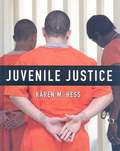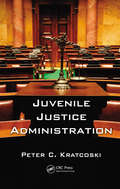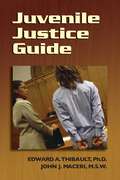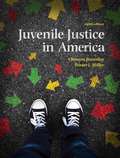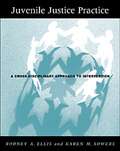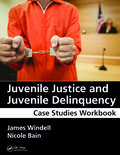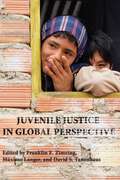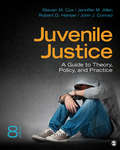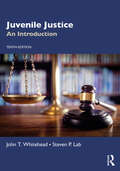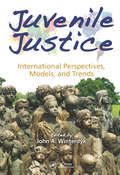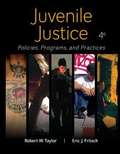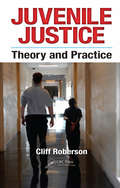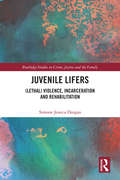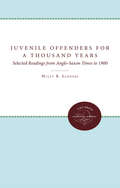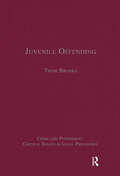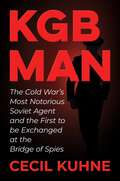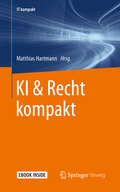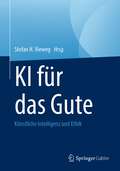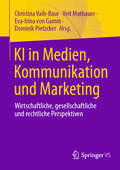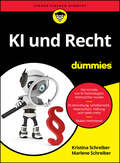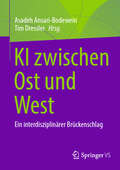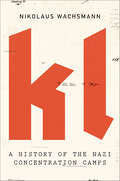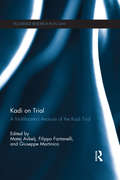- Table View
- List View
Juvenile Justice (5th edition)
by Karen M. HessGain a practical and comprehensive understanding of the juvenile justice system with JUVENILE JUSTICE, Fifth Edition. Highly accessible and student friendly, this text explores various programs and processes that exist in today's juvenile justice system, including prevention efforts through school and community-based programs. The fifth edition also includes expanded coverage of measurement, victimization, differences between the adult and juvenile justice systems, diversity, gangs, future trends in the field, cutting-edge policies, and more.
Juvenile Justice Administration
by Peter C. KratcoskiAn effective administrator must not only have the educational background to understand the foundational basis for the system, but must also be guided by the vision and mission of the organization. Juvenile Justice Administration illustrates through examples and interviews with juvenile justice administrators and other personnel how these organizati
Juvenile Justice Guide (Southwestern College Library)
by Edward A. Thibault M. S. W. John J. MaceriAn extremely thorough look at the juvenile justice system, from entry & sentencing to prevention & counseling. Answers questions like: -What does research say about family life and the propensity for deliquency? -How do juvenile sentencing guidelines differ from adult sentences? -What are the agencies within the juvenile justice system and how do they work? -What are the options for post-crime placement? -What counseling methods are most effective?.
Juvenile Justice In America (Eighth Edition)
by Clemens Bartollas Stuart J. MillerJuvenile Justice in America provides an in-depth look at the lives of juveniles, their experiences in society, and the consequences of those experiences. The text carefully examines the structures, procedures, policies, and problems of American juvenile justice agencies. The Eighth Edition places further emphasis on delinquency prevention, and features a new chapter on juvenile offender populations to give readers a more comprehensive view of delinquents. Boxed features in every chapter highlight the practical realities of working in the juvenile justice system. The careful balance of theory, evidence-based findings, and practical applications gives readers the most up-to-date insight into the state of juvenile justice in America today.
Juvenile Justice Practice
by Rodney A. Ellis Karen M. SowersGives practical and theoretical information for working with juvenile offenders. Provides assessment instruments, sample interviewing tools, and intervention strategies, with chapters on interdisciplinary teamwork in juvenile justice, juvenile justice assessment, interventions with youths and families, interventions for social systems, and interventions to avoid. Also covers different populations, best practices, and evaluation. For use in courses in juvenile justice, treatment of adolescents and families, and criminal justice. The authors are affiliated with the University of Tennessee. Annotation c. Book News, Inc. , Portland, OR (booknews. com)
Juvenile Justice and Juvenile Delinquency: Case Studies Workbook
by James Windell Nicole BainDesigned as a supplemental text for juvenile delinquency and juvenile justice courses, this workbook fills a void in current textbooks. It provides a hands-on experience that helps students understand the kinds of court hearings that take place in juvenile and family courts. It presents information about actual cases and prompts students to make decisions and design court orders for typical juvenile court cases. It also provides a unique opportunity for students to experience what it is like to face decisions in the juvenile court system.
Juvenile Justice in Global Perspective (Youth, Crime, and Justice #1)
by David S. Tanenhaus Franklin E. Zimring Máximo LangerAn unprecedented comparison of juvenile justice systems across the globe, Juvenile Justice in Global Perspective brings together original contributions from some of the world's leading voices.While American scholars may have extensive knowledge about other justice systems around the world and how adults are treated, juvenile justice systems and the plight of youth who break the law throughout the world is less often studied. This important volume fills a large gap in the study of juvenile justice by providing an unprecedented comparison of criminal justice and juvenile justice systems across the world, looking for points of comparison and policy variance that can lead to positive change in the United States. Distinguished criminology scholars Franklin Zimring, Máximo Langer, and David Tanenhaus, and the contributors cover countries from Western Europe to rising powers like China, India, and countries in Latin America. The book discusses important issues such as the relationship between political change and juvenile justice, the common labels used to unify juvenile systems in different regions and in different forms of government, the types of juvenile systems that exist and how they differ, and more. Furthermore, the book uses its data on criminal versus juvenile justice in a wide variety of nations to create a new explanation of why separate juvenile and criminal courts are felt to be necessary.
Juvenile Justice: A Guide to Theory, Policy, and Practice
by Robert D. Hanser Steven M. Cox Jennifer M. Allen John J. ConradBrief, focused, and up-to-date, this must-have text by Stephen Cox, Jennifer Allen, and Robert Hanser takes students on a journey through the juvenile justice system by covering topics such as the history of the juvenile justice system, crime measurements, theories of crime causation, the juvenile justice process, community-based sanctions, treatment and rehabilitation, gangs, and international youth crime. Featuring new examples and new illustrations, Juvenile Justice: A Guide to Theory, Policy, and Practice, Eighth Edition helps readers develop a comprehensive understanding of the interrelationships among theory, policy, and the practical world of juvenile justice today.
Juvenile Justice: An Introduction
by John T. Whitehead Steven P. LabJuvenile Justice: An Introduction, Tenth Edition, presents a comprehensive picture of juvenile offending, delinquency theories, and the ways juvenile justice actors and agencies react to delinquency. Whitehead and Lab offer evidence-based suggestions for successful interventions and treatment and examine the prospects for rebalancing the model of juvenile court. This new edition includes insightful analysis and the latest available statistics on juvenile crime and victimization, drug use, court processing, and corrections. Special attention is given to female involvement, disproportionate minority contact, and diversity issues. The text also includes extensive discussion of police shootings, the issue of race, probation reform, life sentences for juveniles, recent Supreme Court decisions, and reform suggestions from Currie and Feld. An essential text for undergraduate juvenile justice courses, this book offers rich pedagogical features and online resources. Each chapter enhances student understanding with Key Terms, a What You Need to Know section, and Discussion Questions. Links at key points in the text show students where to get the latest information.
Juvenile Justice: An Introduction (5th Edition)
by John T. Whitehead Steven P. LabThe definition and history of delinquency; biological, psychological and sociological explanations; gang delinquency; drugs and delinquency; the juvenile court process; due process and juveniles; institutional and residential interventions; juvenile probation and community corrections; restorative justice; the victimization of juveniles; and future directions of juvenile justice.
Juvenile Justice: International Perspectives, Models and Trends
by John A. WinterdykJuvenile justice has been and remains a topical issue at national and international levels. There are various standards and guidelines for administration, but six major models characterize juvenile justice systems worldwide: participatory, welfare, corporatism, modified justice, justice, and crime control. Juvenile Justice: International Perspectiv
Juvenile Justice: Policies, Programs, And Practices
by Robert W. Taylor Eric J. FritschJuvenile Justice: Policies, Programs and Practices provides a student-friendly introduction to the juvenile justice system. Practical application is emphasized through features that focus on policies, programs, practices and careers.
Juvenile Justice: Theory and Practice
by Cliff RobersonOver several hundred years, the juvenile justice system has evolved from one in which a child offender was prosecuted under the same guidelines used for adults to the current system in which society has recognized the unique status of juveniles within the criminal justice framework. Written by world-renowned legal scholar Cliff Roberson, Juvenile J
Juvenile Lifers: (Lethal) Violence, Incarceration and Rehabilitation (Routledge Studies in Crime, Justice and the Family)
by Simone DeeganThis book is the first Australian study, based on extensive fieldwork, of the personal backgrounds and processes by which juveniles get drawn into risky and violent situations that culminate in murder. Drawing on interviews with every juvenile under sanction of life imprisonment in the State of South Australia (2015–2019), it investigates links in the chain of events that led to the lethal violence that probably would have been broken had there been appropriate intervention. Specifically, the book asks whether the existing criminal justice frame is the appropriate way to deal with children who commit grave acts. The extent to which prison facilitates and/or inhibits the mental, emotional, and social development of juvenile ‘lifers’ is a critical issue. Most – if not all – will be released at some point, with key issues of risk (public protection) and rehabilitation (probability of desistance) coming sharply to the fore. In addition, this book is also the first to capture how significant others including mothers, fathers, grandparents, and siblings are affected when children kill and the level of commitment these relatives have towards supporting the prisoner in his or her quest to build a positive future. Written in a clear and direct style, this book will appeal to students and scholars of criminology, sociology, andpenology; practitioners working in social policy; and all those interested in the lives and backgrounds of juvenile offenders.
Juvenile Offenders for a Thousand Years: Selected Readings from Anglo-Saxon Times to 1900
by Wiley B. SandersAlthough much is being published on the subject of juvenile delinquency, this volume of selected British and American source material provides something new. It includes material so old that it is practically unknown to present-day social scientists and also old material of a local nature that has never had wide circulation.Originally published 1970.A UNC Press Enduring Edition -- UNC Press Enduring Editions use the latest in digital technology to make available again books from our distinguished backlist that were previously out of print. These editions are published unaltered from the original, and are presented in affordable paperback formats, bringing readers both historical and cultural value.
Juvenile Offending
by Thom BrooksTackling juvenile offending has become a key part of crime reduction strategies. The articles selected for this volume examine juvenile offending from various critical perspectives and represent the work of the most influential international figures in the field. The issues addressed include: the different needs and perspectives of youth offenders; whether offenders should be treated differently from others because of their age; recommendations of policy changes; identification of risk factors; issues surrounding the sentencing of juvenile offenders; and the relevance of restorative justice.
Juvenile Procedures in California
by Edward E. PeoplesThis text is designed for a college entry level class in the study of juvenile justice in California. It presents a detailed account of juvenile procedures, from the point of initial contact by law enforcement through the court process and correctional systems. The history of California's juvenile justice system is also included.
KGB Man: The Cold War's Most Notorious Soviet Agent and the First to be Exchanged at the Bridge of Spies
by Cecil KuhneA thin, balding, and reclusive middle-aged Russian by the name of Rudolf Ivanovich Abel was one of the Soviet Union&’s most renowned spies during the Cold War of the 1950s…until his cover was blown by an incompetent colleague who wanted to defect to the United States. This is the full account of Abel&’s espionage work, his dramatic apprehension, his eventual conviction and its affirmation by the United States Supreme Court, and finally, his surprising release back to Russia.Rudolf Ivanovich Abel ran KGB operations in the United States for nine years during the Cold War of the 1950s, until one day his true identity was revealed by a lazy, hard-drinking, womanizing colleague who decided to defect to the United States before he was sent back to Russia—and presumably his death—for incompetence in the field. As the authorities hunted down Abel, the FBI had in hand his tools of trade—hollowed-out bolts and coins used to send tiny coded messages and photographs back and forth to the Soviet Union—but little else in the way of hard leads. After Abel was located, his modest hotel in Manhattan was staked out by the FBI for over a month before he was eventually arrested and tried for espionage. After his conviction, Abel appealed his case to the Second Court of Appeals, where he argued that the search and seizure of his hotel room was unconstitutional because they were made without a warrant. His conviction was affirmed, and the case proceeded to the Supreme Court, which was sharply divided. The cliffhanger facing Abel for the next several years was whether he would face the electric chair, remain in prison for the rest of his life, or be exchanged for an American spy held by the Russians. His fate remained in the balance.
KI & Recht kompakt (IT kompakt)
by Matthias HartmannDas Buch gibt einen kompakten Einblick in alle wesentlichen Rechtsfragen rund um den Einsatz Künstlicher Intelligenz in Unternehmen oder Produkten. Versierte Autoren mit Praxiserfahrung erläutern die wichtigsten rechtlichen Themen beim Einsatz intelligenter Systeme und behandeln nach einer Einführung in die technischen Grundlagen die Auswirkungen und Besonderheiten Künstlicher Intelligenz in den Bereichen:ZivilrechtVertragsgestaltungLizenzierung HaftungImmaterialgüterrechte DatenschutzStrafrechtArbeitsrecht
KI für das Gute: Künstliche Intelligenz und Ethik
by Stefan H. ViewegWährend die Technologie im Zeitalter des maschinellen Lernens rasant voranschreitet, mangelt es an klaren Absichten und der Formulierung akzeptabler ethischer Standards. Dieses Buch fasst das komplexe Thema der "guten" Technologie bereichsübergreifend zusammen und wechselt zwischen Theorie und Praxis. Die Autoren gehen auf die sich ständig ausweitende Diskussion über Künstliche Intelligenz (KI) und Ethik ein und geben eine Orientierung. Dabei werden insbesondere pragmatische und aktuelle Fragestellungen berücksichtigt, wie z.B. die Kollateralwirkungen der COVID19-Pandemie. Ein aktueller Überblick über die Digitalisierung - an sich schon ein sehr weites Feld - wird ebenso vorgestellt wie eine Analyse der Ansätze von KI aus ethischer Perspektive. Darüber hinaus werden konkrete Ansätze zur Berücksichtigung angemessener ethischer Prinzipien in KI-basierten Lösungen angeboten. Das Buch richtet sich sowohl an Wissenschaftler aus geistes- und wirtschaftswissenschaftlichen oder technischen Disziplinen als auch an Praktiker, die eine Einführung in das Thema und eine Orientierung mit konkreten Fragen und Hilfestellungen suchen.
KI in Medien, Kommunikation und Marketing: Wirtschaftliche, gesellschaftliche und rechtliche Perspektiven
by Dominik Pietzcker Christina Vaih-Baur Veit Mathauer Eva-Irina von GammDer Herausgeberband beleuchtet den aktuellen globalen Einsatz von Künstlicher Intelligenz im Kommunikationssektor aus wirtschaftlicher, gesellschaftlicher und rechtlicher Perspektive. Auch der Blick der Rezipienten auf Produkte künstlicher Intelligenz wird dabei empirisch untersucht. Was sind ihre Erwartungen, Idiosynkrasien und Einstellungen gegenüber Künstlicher Intelligenz und ihren vielfältigen Anwendungen? Die Beiträge umfassen neben wissenschaftlichen Analysen auch aktuelle Trends aus Sicht von Praktikern und Experten. Die kritisch-analytische Betrachtung von KI-Anwendungen in Sub- und Populärkultur rundet den gesamten Band ab.
KI und Recht für Dummies (Für Dummies)
by Kristina Schreiber Marlene SchreiberRechtssicherheit bei der Entwicklung und Nutzung von KI gewinnen Lassen auch Sie sich von KI unterstützen – Content von ChatGPT erstellen, Grafiken von Midjourney gestalten und Fragen von CoPilot beantworten? Oder nutzen Sie schon KI-Modelle in Ihren eigenen Systemen und bieten Kundenservice via Chatbot mithilfe künstlicher Intelligenz an? Haben Sie dabei Datenschutz, Urheberrecht, die Vorgaben der KI-Verordnung und Haftungsfragen im Blick? Dieses Buch erklärt Ihnen verständlich und praxisnah die rechtlichen Aspekte der Nutzung künstlicher Intelligenz und hilft Ihnen dabei, rechtliche Fallstricke zu erkennen und Risiken zu minimieren – damit Sie die Effizienz und Innovationskraft von künstlicher Intelligenz rechtssicher nutzen können! Sie erfahren Was die KI-Verordnung für Ihre Nutzung von KI bedeutet Welche Rolle das Urheberrecht bei der Contenterstellung mit KI spielt Was für das Training von KI-Systemen gilt Wie Sie Chatbots rechtssicher einsetzen
KI zwischen Ost und West: Ein interdisziplinärer Brückenschlag
by Asadeh Ansari-Bodewein Tim DresslerDer vorliegende Band beleuchtet aktuelle Problemstellungen im Kontext der Entwicklung Künstlicher Intelligenz aus der Perspektive verschiedener akademischer Disziplinen (Philosophie, Sinologie, Informatik, Soziologie) und gibt einen Überblick über den jeweiligen Forschungsstand. Ein besonderes Augenmerk liegt dabei auf der Einbeziehung der sinologischen Perspektive, da China in Europa seit vielen Jahren insbesondere im Zusammenhang mit Diskussionen um die Auswirkungen von KI wahrgenommen wird.
KL: A History of the Nazi Concentration Camps
by Nikolaus WachsmannThe “deeply researched, groundbreaking” first comprehensive history of the Nazi concentration camps (Adam Kirsch, The New Yorker).In a landmark work of history, Nikolaus Wachsmann offers an unprecedented, integrated account of the Nazi concentration camps from their inception in 1933 through their demise, seventy years ago, in the spring of 1945. The Third Reich has been studied in more depth than virtually any other period in history, and yet until now there has been no history of the camp system that tells the full story of its broad development and the everyday experiences of its inhabitants, both perpetrators and victims, and all those living in what Primo Levi called “the gray zone.”In KL, Wachsmann fills this glaring gap in our understanding. He not only synthesizes a new generation of scholarly work, much of it untranslated and unknown outside of Germany, but also presents startling revelations, based on many years of archival research, about the functioning and scope of the camp system. Closely examining life and death inside the camps, and adopting a wider lens to show how the camp system was shaped by changing political, legal, social, economic, and military forces, Wachsmann produces a unified picture of the Nazi regime and its camps that we have never seen before.A boldly ambitious work of deep importance, KL is destined to be a classic in the history of the twentieth century.Praise for KLA Wall Street Journal Best Book of 2015A Kirkus Reviews Best History Book of 2015Finalist for the National Jewish Book Award in the Holocaust category“[A] monumental study . . . a work of prodigious scholarship . . . with agonizing human texture and extraordinary detail . . . Wachsmann makes the unimaginable palpable. That is his great achievement.” —Roger Cohen, The New York Times Book Review“Wachsmann’s meticulously detailed history is essential for many reasons, not the least of which is his careful documentation of Nazi Germany’s descent from greater to even greater madness. To the persistent question, “How did it happen?,” Wachsmann supplies voluminous answers.” —Earl Pike, The Plain Dealer (Cleveland)
Kadi on Trial: A Multifaceted Analysis of the Kadi Trial (Routledge Research in EU Law)
by Matej Avbelj Giuseppe Martinico Filippo FontanelliThe judgment of the European Court of Justice concerning the Kadi case has raised substantive and procedural issues that have caught the attention of scholars from many disciplines including EU law, constitutional law, international law and jurisprudence. This book offers a comprehensive view of the Kadi case, and explores specific issues that are anticipated to resonate beyond the immediate case from which they derive. The first part of the volume sets out an analysis of the new judgment of the Court, favouring a "contextual" reading of what is the latest link in a judicial chain. The following three parts offer interdisciplinary accounts of the decision of the European Court of Justice, including legal theory, constitutional law, and international law. The book closes with an epilogue by Ernst-Ulrich Petersmann, who studies the role of the Kadi case in the methodology of international law and its contribution to the concept of global justice. The book brings together legal scholars from a range of fields, and discusses pressing topics such as the European Union’s objective of ‘the strict observance and the development of international law’, the EU as a site of global governance, constitutional pluralism and the protections of fundamental rights.
